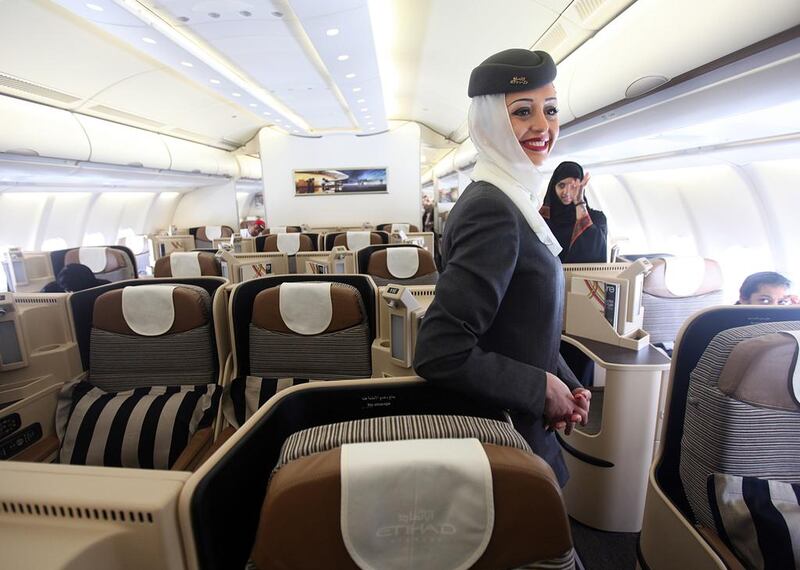In reference to the article Etihad and Emirates chiefs prepare for battle of the skies (March 17), I wish the West would stops trying to judge the entire world by western standards as to what is considered acceptable.
Qatar Airways and Emirates, in particular, have come under fire in the western press for having recruitment policies that differ from those in Europe and the US.
We are all guilty of voting with our wallets. Who wants to pay more to travel on an old aircraft with ageing crew (and extremely limited entertainment options)? Not me. I have different issues with the UAE-based airlines relating to high prices for travellers originating their trips in Dubai or Abu Dhabi, but am I going to start a petition or lobby anyone that it is unfair?
Of course not, it is a fact of life. American jobs are being supported by the Gulf carriers purchasing huge numbers of aircraft the US and European airlines can only dream of.
Stop the double standards and start competing. There are reasons why Emirates and Etihad are rated consistently as among the best airlines in the world.
Darren Bennett-Voci, Dubai
I have flown with Etihad a number of times. They are absolutely wonderful – I have never once had a problem. The planes are all modern, clean and the on-board service is consummate, slick, professional and, above all, friendly. I never have to think twice about booking with Etihad. If anything, I think the Americans might be a bit jealous.
Josh C, Abu Dhabi
UAE can change their game plan
The UAE came very close to toppling a couple of more experienced rivals in the Cricket World Cup and can be proud of their efforts – the team will have learnt a great deal from the experience (Step up to the crease, March 18).
Your suggestion that there should be a regional tournament held perhaps every two years in the UAE is a good one with teams from all over the Gulf region, as well as Afghanistan and Pakistan’s B teams, taking part.
The UAE’s recent World Cup campaign proved that more frequent games against competitive sides in the Middle East will ensure further progress is maintained and that standards will continue to rise.
David Willis, Abu Dhabi
How about a ‘solar holiday’?
The article Europe braces for power disruption from solar eclipse (March 18) is an interesting twist on the future of solar power throughout the world. Of course, there is no solar power when there is no “sol” – at night, during a total solar eclipse; and always less than optimum on a cloudy day.
As six out of 10 of the world’s leading solar power producers are in the umbras of Friday’s solar eclipse, I suggest that the affected countries declare a solar holiday by reducing their use of electricity.
Alternate energy sources to fossil fuels are a good and necessary adaptation, now and for the future. However, if Earth’s energy consumption continues to escalate at the present rate, in 2,500 years we will require all the energy produced by all the stars in this corner of the galaxy.
Let people innovate, if only for half a day, different ways to reduce energy consumption. Turn off the neon signs at your felafel shop. Employ a homeless person to advertise for you with a sandwich board. Shut down the forced air heating and cooling – open the windows. This “holiday” will prepare us for the immediate and long-term future now. It might prevent damage from power surges and damage to the reputation of solar power’s excellent record and prospects.
Michael Creamer, Abu Dhabi
Netanyahu stand will hurt Israel
The EU will apparently now have no option but to implement economic and political sanctions against Israel as Benjamin Netanyahu comes clean with his real intentions to annex the West Bank in a push for a "Greater Israel" (Incitement defines this Israeli election, March 17).
This would entail implementing Likud’s original charter that requires the “transfer” of all Arabs out of former Palestine.
In the interim, by this gift to the illegal settlers, both the Israeli government and the entire electorate have a serious problem indeed with existing bilateral trade with Europe. Israel’s two primary trading partners, the EU and the US, would be obliged to cut or restrict trading ties with the recalcitrant government until it decides to comply with the will of the United Nations.
Furthermore, Mr Netanyahu’s declaration that the peace process is dead and buried will send tremors throughout the international community. And this is the signal for the Palestinian Authority to move decisively in the UN and other international institutions to include its application to the International Criminal Court to declare the Israeli settlements in the occupied territories a war crime.
Anthony Bellchambers, UK





